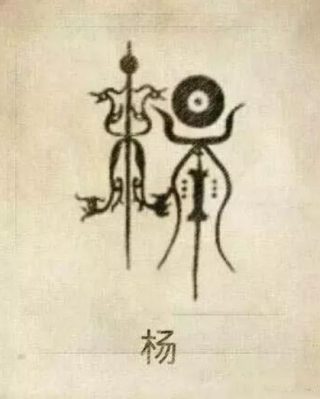Origins of the Yang(yáng) Surname: Royal Roots and Cultural Blending

- The Royal Ji Bloodline
The Yang(yáng) surname originated from the Ji family of the Zhou Dynasty (1046–256 BCE), China’s foundational royal lineage. Historical records show that during the Western Zhou period, descendants of Shu Yu (younger brother of King Cheng of Zhou) were granted the territory of Yang (modern-day Hongdong County, Shanxi Province). After the State of Yang was conquered by the Jin Kingdom in the 6th century BCE, its people adopted "Yang" as their surname, establishing the primary lineage.
- Multicultural Integration
The Yang surname reflects China’s history of ethnic diversity:
Xianbei Adoption: During the Northern Wei Dynasty (386–534 CE), the Xianbei tribe’s Mohulu Clan adopted "Yang" as part of cultural reforms.
Di and Qiang Influences: The Di people’s Yang clan, including rulers of the Former Chouchi Kingdom (3rd–4th century CE), merged into Han Chinese society.
Manchu-Mongolian Contributions: In the Qing Dynasty (1636–1912), Manchu Nimaca and Mongolian Silate clans adopted the Yang surname.
Historical Figures: Pioneers Across Three Millennia
- Politics & Military Leadership
Yang Zhen (Eastern Han Dynasty, 25–220 CE): Known as the "Four Knows Official" for refusing bribes with the phrase: "Heaven knows, Earth knows, you know, and I know." His integrity became a model for Chinese governance.
Emperor Wen of Sui (581–618 CE): Born Yang Jian, he reunified China after 300 years of division and established administrative systems that shaped East Asian bureaucracy.
Yang Ye (Northern Song Dynasty, 960–1127): Legendary general of the Yang Family Generals, immortalized in operas and novels for defending China’s northern borders.
- Arts & Literature
Yang Jiong (Tang Dynasty, 618–907): One of the "Four Great Poets of Early Tang," known for pioneering frontier-themed poetry.
Yang Ningshi (Five Dynasties, 907–960): Calligrapher whose Leek Flower Letter is ranked among China’s top five classical cursive scripts.
Yang Shen (Ming Dynasty, 1368–1644): Scholar-poet whose work Linjiang Immortal opens the classic novel Romance of the Three Kingdoms.
- Science & Modern Innovation
Yang Hui (Southern Song Dynasty, 1127–1279): Mathematician who documented the "Yang Hui Triangle" (Pascal’s Triangle) centuries before European scholars.
Chen-Ning Yang (Modern Era): Nobel Prize-winning physicist who co-developed the Yang-Mills Theory, foundational to particle physics.
Yang Liwei (Contemporary): China’s first astronaut, symbolizing the nation’s advancements in aerospace technology.
Migration & Family Traditions: From Shanxi to the World
- Historical Migration Paths
Qin-Han Era (221 BCE–220 CE): Spread from Shanxi to Henan and Shaanxi, forming influential clans like the Hongnong Yang.
Tang-Song Southern Migration: Post-8th century upheavals drove Yang families to Fujian and Guangdong. By the Ming Dynasty, branches reached Southeast Asia.
Global Diaspora: During the Qing Dynasty, Fujianese Yang clans migrated to Taiwan, while Guangdong families settled in Malaysia and Singapore.
- Cultural Heritage
Ancestral Halls: The Yang Family Compound in Shanxi, a UNESCO-protected Qing Dynasty architectural complex, showcases clan prosperity.
Family Values: The Yang clan’s motto, "Act with integrity, think with caution" , emphasizes ethical discipline and scholarly pursuit.
Cultural Impact & Modern Significance
- Philosophical & Ethical Legacy
Yang Zhu’s Philosophy (4th century BCE): Early advocate of individualism, sparking debates on self-interest versus collective ethics.
Anti-Corruption Symbolism: Yang Zhen’s "Four Knows" principle remains referenced in modern governance discussions.
- Economic & Technological Contributions
Historic Trade Networks: Yang merchants dominated the Ancient Tea Horse Road, bridging China with Central Asia.
Modern Innovations: Yang scientists lead in AI, quantum computing, and aerospace engineering. For example, Yang Wei’s team pioneered China’s J-20 stealth fighter program.
- Global Cultural Bridges
Pop Culture Legacy: The Yang Family Generals legend has inspired over 50 films/TV series, epitomizing loyalty and courage.
Worldwide Connections: The World Yang Clan Association links 5 million members across 30+ countries, fostering cultural exchange and education initiatives.
Conclusion
The Yang surname embodies China’s enduring cultural DNA—a fusion of royal heritage, intellectual brilliance, and adaptive resilience. From ancient mathematicians to Nobel laureates, and from Shanxi courtyards to Silicon Valley labs, the Yang legacy demonstrates how a family name can transcend generations to become a global symbol of innovation and tradition. Today, over 50 million Yang descendants worldwide continue to shape fields as diverse as quantum physics, aerospace engineering, and cross-cultural diplomacy.